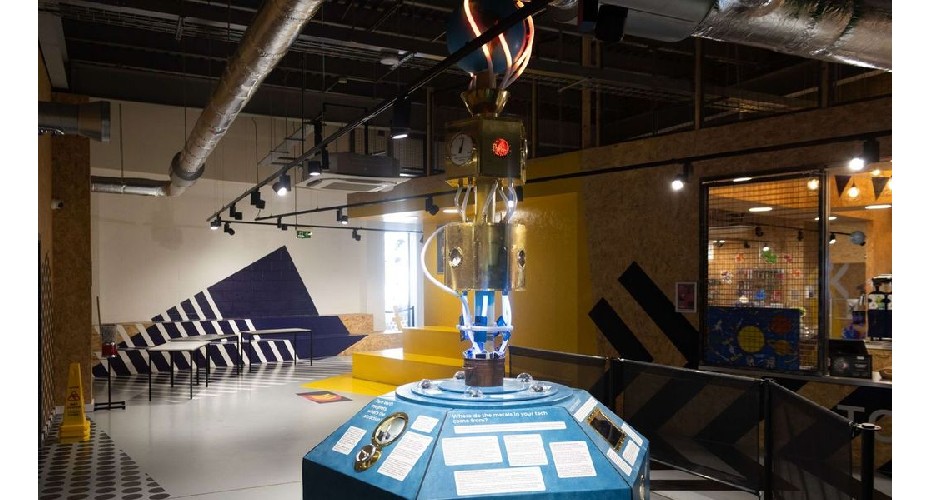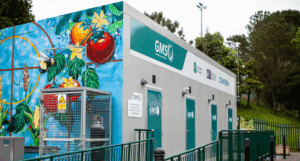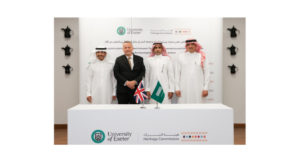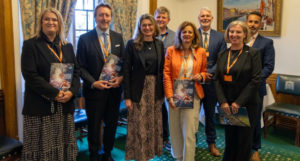Interactive exhibition invites public to help find the critical balance for critical metal use in green technology

Experts including those from the University of Exeter have created the ‘New Precious Metals’, Unearthing the Treasures in Our Everyday Tech exhibit.
The public are set to be given a fascinating new insight into how metals crucial for everyday technologies can be extracted, used and refurbished and recycled, through an innovative new interactive exhibit.
A team of experts, featuring researchers from the University of Exeter, have created the ‘New Precious Metals’, Unearthing the Treasures in Our Everyday Tech exhibit, which will be shown at the Science Discovery Centre; Xplore!, in Wrexham, from Monday, April 15th.
The interactive exhibit, which stands at around 3.5m in height, allows visitors to try and solve the increasing demand for metal resources by either building more mines – or by repairing, refurbishing and recycling existing extracted precious metals.
Participants will find out the scale of the demand for metals such as lithium, tin, and cobalt, as well as learn more about how technology metals make a big difference to everyday items such as phones and computers, as well as large-scale industry.
As well as the physical, visible treatment of objects, visitors will also learn more about the extensive and complex journey that takes place from rocks to recycling. Politics, regulation, and policies will also play a huge role in sustaining the supply of these magical metals.
Technology metals are critical materials that will enable the transition to net zero because their special properties enable the functions of wind turbine motors, solar panels circuits, electric vehicle batteries, and many other technologies needed for the green transition. As modern life becomes more digital, these technology metals are necessary for the devices we use to communicate across the globe.
Researchers from the University of Exeter, University of Birmingham, University of Leicester, University of Manchester, the British Geological Society and Aston University have been working together over the past three years as part of the National Interdisciplinary Circular Economy Research (NICER) Programme to understand the opportunities and barriers for a sustainable technology metal supply chain. The collaboration covers all aspects portrayed and brought to life by Extractors AND Circulators. The team goes by the name Met4Tech.
Frances Wall, Professor of Applied Mineralogy at the Camborne School of Mines, University of Exeter said; “The concepts of a circular economy supply chain stretch much further than just recycling at the end of life.
“A circular economy starts right from the beginning of a supply chain, from responsible extraction of resources, through thoughtful product design, operating through different business models and at the very end of the life of any product – be it a phone or a wind turbine – how to efficiently and effectively recycle the constituent parts with minimal environmental impact.
“The team on Met4Tech have worked hard to make the ‘New Precious Metals’, Unearthing the Treasures in Our Everyday Tech exhibit interactive and informative so visitors can be confident in what a circular economy for technology metals is and how they can play their part as we transition to net zero.”
Katie Williams, Business Development Officer at Xplore! Science Discovery Centre said;
“ Xplore! is delighted to play host to a wonderful day of science engagement. The day which introduces a brand-new exhibit, one that perfectly fits in with Xplore!’s previous work with Less Common Metals, is a fantastic opportunity to engage the public and leaners from Ysgol Plas Coch in the importance of critical minerals and the wide range of ways that they are used.
“We hope that in the coming weeks the brand new exhibit, in the walkway at Xplore!, will allow even more visitors to understand the importance of rare earth elements and the things they can do reduce, reuse and recycle.”



